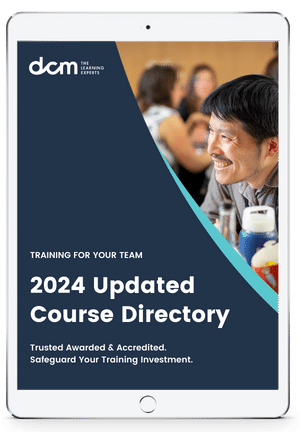If you’re asking yourself whether it’s better to get the PMP certification or the Lean Six Sigma certification, you’ll find that there’s no straightforward answer to that question. The two are based upon separate bodies of knowledge and require a demonstration of competency in different areas.
Here at DCM Learning, we’re often asked which is better: PMP or Lean? DCMs Senior Lean Trainer, Padraig McCabe, doesn’t really see this as a valid question, “ They’re both different techniques that are applicable in different scenarios”.
The Differences Between Lean Six Sigma and PMP Certification
Project managers who have earned the PMP certification have been trained on how to lead a team to project success. This certification focuses on how to complete deliverables in a project within the constraints of scope, schedule, and cost. There are five process groups that organise the 49 processes of the PMBOK® Guide: Initiating, Planning, Executing, Monitoring and Controlling, and Closing.
Lean Six Sigma certification is not specifically for project work as it can be equally beneficial for the operational aspects of an organization. Lean Six Sigma certification holders rely on statistical analysis to support decisions on how to eliminate waste and decrease defects. A commonly known cycle within Six Sigma is called DMAIC: Define, Measure, Analyze, Improve, and Control. Also commonly used is Design for Six Sigma, which includes the five phases of DMADV: Define, Measure, Analyze, Design, and Verify. While DMAIC is primarily concerned with improving existing processes in an organization, DFSS and DMADV are meant to design new processes where one currently does not exist or needs to be replaced.
The Similarities Between Lean Six Sigma & PMP Certification
While both certifications are based on underlying bodies of knowledge, you may have noticed in the previous section that the PMP and the Six Sigma certifications have separate focuses. The PMBOK® Guide is primarily meant to improve effectiveness (project success) while Lean Six Sigma is primarily meant to improve efficiency (completing work for the least amount of time, money, and resources). While one objective may incidentally improve the other, the best way to ensure maximized effectiveness and efficiency is to ensure that your organization adopts both bodies of knowledge.
PMP certifications and Lean Six Sigma certifications both hold value, not only in the project management community but in the business world, too. These two certifications give project managers a competitive advantage over other applicants, making them enticing hires for any organization.
Both certifications are recognized globally, meaning certification holders have a variety of international and domestic opportunities. The two certifications can be applied to numerous industries, and the certification holders aren’t the only ones who benefit. The organizations that hire them can count on successful projects managed by productive employees.
Lean Reviews: Stories from Our Customers
Over the past 2 years, over 2,000 learners (2,197 to be exact) have come to DCM to learn more about lean and get certified. Read (and watch) their reviews to see how our courses have helped them achieve their career goals.
Inhouse Tailored Training for Your Team
We provide training programs that are developed by industry, for industry. Our range of programs can be delivered in a way that suits the needs of your business to offer your employees learning that is accessible and flexible.
We add value to your business by providing specialised, flexible and scalable training that meets your training needs. As your workforce grows and evolves, our globally certified and industry-validated learning solutions can assess, train and qualify your employees. For more information on how we can help please visit the in-house training page.
Membership, Stay Connected. Stay Relevant.
Completing a program is a point-in-time exercise that delivers huge value, but there is a next step to maintaining the currency of your skills in the ever-evolving professional world.
Membership is the next step.
A unique platform, membership is designed to ensure that you are in tune and up-to-date with the latest tools, trends and developments. Being a member provides just-in-time training and continuous professional development, and an exclusive and evolving content library informed by subject matter experts and industry leaders.







